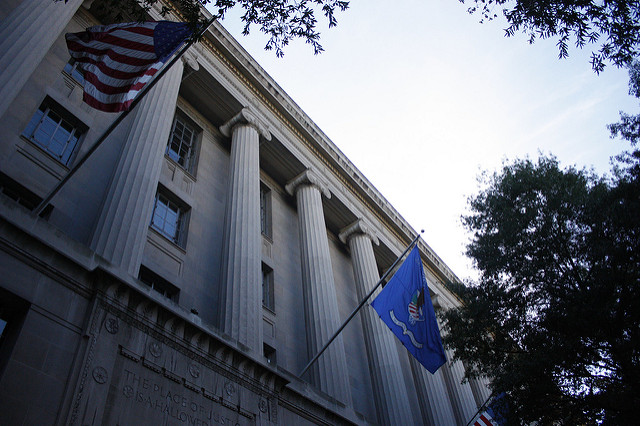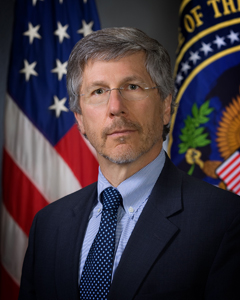A Test of Character at the Justice Department
As was long anticipated, President Trump this week sacked Attorney General Jeff Sessions and designated Matthew Whitaker as acting attorney general. Others have debated the legality of Whitaker’s designation, and whether he is disqualified from supervising Special Counsel Robert Mueller’s investigation. But apart from legality, the present circumstances pose a crucial test of character for Whitaker and others.

As was long anticipated, President Trump this week sacked Attorney General Jeff Sessions and designated Matthew Whitaker as acting attorney general. Others have debated the legality of Whitaker’s designation, and whether he is disqualified from supervising Special Counsel Robert Mueller’s investigation. But apart from legality, the present circumstances pose a crucial test of character for Whitaker and others.
The first, and most important, test is Whitaker’s. He takes office with a background of political partisanship, a record of statements critical of the Mueller investigation and personal connections to a witness in that investigation. And there are suggestions that he was selected to succeed Sessions over Deputy Attorney General Rod Rosenstein, who would have been the normal choice for the role, because of Whitaker’s loyalty to the president.
None of this necessarily means Whitaker is incapable of serving as acting attorney general or of supervising the Mueller investigation. But the unprecedented nature of his designation, and the issues raised by his background, reinforce the need for him to demonstrate that he will defend the institutional interests of the Department of Justice and the department’s independence and non-partisanship—most importantly with respect to his handling of the Mueller investigation.
It is critical that this investigation be allowed to run its course without political interference—critical both in that the nation needs to learn the full extent of Russian attempts to influence U.S. elections, and critical to public confidence that the law is applied fairly and on a nonpartisan basis. Acting Attorney General Whitaker can take several steps to bolster public confidence.
First, in light of questions that have been raised about recusal, Whitaker should not only consult department ethics officials but should release to the public their advice to him insofar as it relates to the Mueller investigation, except to the extent that this advice might touch on privileged matters relating to former clients of Whitaker’s.
Second, he should pledge that he will not disclose sensitive details of the Mueller investigation to anyone in the White House, at least not without securing the agreement of Mueller and his team that doing so would not compromise the investigation.
Third, he should immediately obtain a full briefing from Mueller about the scope and direction of his investigation. Because Attorney General Sessions was recused, it’s not clear whether Whitaker—Sessions’s former chief of staff—has been kept informed about the progress of the investigation. If Whitaker is to supervise Mueller’s investigation, he needs to ensure that any decisions he makes are based on complete information.
Fourth, and most important, Whitaker has to accept the responsibility to defend the Department of Justice and its interests, rather than undermine them. He needs to adhere to the department’s traditional policies and avoid any perception that his decisions are affected by political considerations on matters such as the declassification of sensitive national security information; the response to excessive congressional demands for information; the protection of department personnel from political harassment; and, most critically, the continuation of the Mueller investigation.
Mueller—a distinguished public servant who by all accounts is a Republican—and his team have achieved significant results in an investigation of deep importance to U.S. national security, including guilty pleas in which former high-ranking officials of the Trump campaign have voluntarily and openly admitted criminal conduct. Because the investigation touches on the personal interests of the president, and because the president and other Republicans have been so vigorous in their denunciations of it, any attempt to limit Mueller’s activity will inevitably be perceived as politically motivated and will taint the Justice Department’s reputation for integrity. The department will be far better served by letting the investigation run its course and allowing its conclusions to be conveyed to the public to the greatest extent possible.
Whitaker’s conduct will determine whether he is remembered like Robert Kennedy—who overcame inexperience, a partisan background and close ties to the president to lead the department with distinction—or Harry Daugherty, Warren Harding’s campaign manager and corrupt attorney general who helped cover up the Teapot Dome scandal.
But Whitaker is not the only one facing a test of character; Deputy Attorney General Rosenstein and FBI Director Chris Wray do as well. While their actions to date have not been free from criticism, both Wray and Rosenstein have shown a willingness to defend the department and the bureau against inappropriate political attacks. Rosenstein in particular has publicly defended Mueller and his investigation. Going forward, they both need to convey forcefully to Acting Attorney General Whitaker why the institutional interests of the department require that Mueller be allowed to pursue his investigation unfettered.
I do not know what advice Rosenstein and Wray would give Whitaker. But if they advise him to allow the Mueller investigation to continue, as I believe they should, and he chooses to limit that investigation against their advice, they should resign. There is no matter that is more important to the long-term health of the Justice Department than the insulation of law enforcement from political influence. While individuals within an agency can sometimes serve an important role as a moderating influence, such a fundamental abdication of responsibility by the acting attorney general would warrant a public rebuke by Wray and Rosenstein following the examples of Elliot Richardson and William Ruckelshaus, who resigned rather than obey President Nixon’s order to fire Watergate Special Prosecutor Archibald Cox.
Finally, the Republicans in Congress also face a test of character. Many of them have made public statements acknowledging the importance of preserving the independence of the Justice Department and of allowing the Mueller investigation to run its course. But statements are not enough. Republicans must recognize that this is not a partisan issue: it is a matter of national security and of the rule of law. They must make clear that any efforts to limit Mueller will have concrete consequences, not just hand-wringing.
Individuals in public service must occasionally decide whether or not to take actions that are in the interest of the nation but are against their personal or political interest. The test of their characters is whether they are willing to risk damage to themselves—perhaps even the ends of their careers—to do what is needed for the country. Americans will see who meets that test.


.jpeg?sfvrsn=e13b9854_7)

